GCI pastor and district pastoral leader Rick Shallenberger recently traveled to Africa on behalf of GCI President Joseph Tkach. For a report on his time in Zambia, click here. For a report on his time with church leaders in Malawi, click here. Rick’s report on his visit to Malawi continues below.

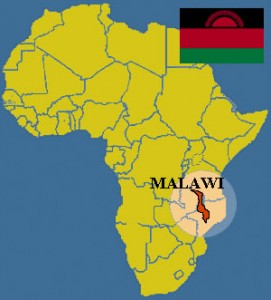 It was a joy to spend ten days visiting our churches in Malawi. What struck me more than anything was the dedication of the pastors. Everything they do is for their churches. They are constantly looking for ways to reach more people with limited resources. It was exciting and humbling to spend time with them.
It was a joy to spend ten days visiting our churches in Malawi. What struck me more than anything was the dedication of the pastors. Everything they do is for their churches. They are constantly looking for ways to reach more people with limited resources. It was exciting and humbling to spend time with them.
Music plays a big part in their churches. Every one I visited has multiple choirs and singing groups. They sing as they stand and walk to and from the front of the church. The whole congregation sings before the sermon (asking for inspiration) and then after (giving thanks). Many of the churches also incorporate dancing. On more than one occasion I found myself standing and dancing with the choir!
I was also impressed by the creativity (and hard work!) shown in how the churches finance their work. Because they (like the nation) are quite poor, they must seek outside income. They have done so primarily through the GCI-run Young Ambassador Private Primary School (YAPPS) in Blantyre and the Kabanga Farm project. These two ongoing projects provide a continuing stream of income.
Let me now introduce you to our Malawi churches and those who lead them.
Gardner & Loney Kunje
Chairman of the GCI-Malawi National Ecclesiastical Council of Elders, Gardener Kunje and his wife, Loney, have a home in Lilongwe. Gardener, who works for Malawi Revenue Authority, was recently transferred to work in Mzuzu, a few hours north of Lilongwe. He assists the pastor there and comes home as often as he can. Gardner and Loney’s two children, Edith and Monica are part of the Young Adult Leaders team working with youth and young adults in and around Lilongwe.
Blantyre Church and YAPPS: Fadrick & Martha Nihaka
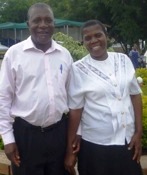 Pastor Nihaka co-pastors the main church in Blantyre, which meets in the YAPPS meeting hall. Fadrick is director of YAPPS. He and Martha started this school with two students and three faculty members in the mid 90s and now have almost 400 students and constantly turn students away due to lack of space. Both Fadrick and Martha have bent over backwards to enhance the Malawi experience for my daughter Kayla and Carrie Smith (daughter of GCI pastor Tom and Pam Smith), who have been teaching at YAPPS for the past several months. He also made sure I experienced as much as I could in Malawi and made arrangements for me to speak at several congregations and spend time with several pastors during my two week stay. We met as acquaintances and departed as brothers and friends.
Pastor Nihaka co-pastors the main church in Blantyre, which meets in the YAPPS meeting hall. Fadrick is director of YAPPS. He and Martha started this school with two students and three faculty members in the mid 90s and now have almost 400 students and constantly turn students away due to lack of space. Both Fadrick and Martha have bent over backwards to enhance the Malawi experience for my daughter Kayla and Carrie Smith (daughter of GCI pastor Tom and Pam Smith), who have been teaching at YAPPS for the past several months. He also made sure I experienced as much as I could in Malawi and made arrangements for me to speak at several congregations and spend time with several pastors during my two week stay. We met as acquaintances and departed as brothers and friends.
Fadrick and Martha have five adult children, some of whom assist at the school in various ways. They lost a daughter in 1988 and her young son, Peter, lives with Fadrick and Martha. Fadrick also pastors a church in a village about 30 minutes outside Blantrye, assisted by church leader Charles Mpaze.
In addition to his school administration responsibilities and pastoral duties in Blantyre, Fadrick serves with William Mankhomwa (see below) as pastor over two congregations in Mulanje (Minimini and Mombezi) and one in Chiradzulu (Mpanda). Fadrick also serves on the Board of Directors for Yamikani House, an orphanage in a very poor part of Blantyre. Fadrick helps with administrative duties and often visits the orphanage to offer assistance and to read to the children.
Fadrick is 67 and looks forward to retiring near Naminjale, where he would like to build hostels on the church property. These hostels can be used to house members and ministers for church events and can also be rented throughout the year providing an income stream for the churches.
Blantyre & Satellite churches: William & Chrissy Mankhomwa
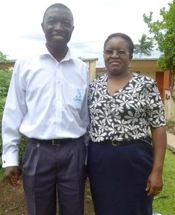 William was ordained in 1996 and serves as co-pastor of the Blantyre congregation as well as co-pastor of the afore-mentioned satellite congregations. William is a bi-vocational pastor working full time for a government institution known as the Malawi National Examinations Board (MANEB), setting up examinations, and training others to do the same. He lives in Zomba, which is more than an hour from Blantyre. William gets excited when talking about the church and the various congregations he is serving. He is quick to point out the members are committed to serving Jesus and are excited about the gospel of grace.
William was ordained in 1996 and serves as co-pastor of the Blantyre congregation as well as co-pastor of the afore-mentioned satellite congregations. William is a bi-vocational pastor working full time for a government institution known as the Malawi National Examinations Board (MANEB), setting up examinations, and training others to do the same. He lives in Zomba, which is more than an hour from Blantyre. William gets excited when talking about the church and the various congregations he is serving. He is quick to point out the members are committed to serving Jesus and are excited about the gospel of grace.
Most of the church growth is taking place among poor rural people, many of whom are illiterate. Most who can read do not have Bibles. This adds to the challenge of serving and teaching them. Further it is a challenge just to reach these children of God. In fact, William’s greatest challenge for visiting the churches in Malawi is the cost and availability of fuel and the poor road conditions. Some of the areas are unreachable during the wet season. Another great challenge William and other pastors face is the difficulty in being connected to other GCI pastors and to Headquarters. Internet service in Malawi is expensive and not always dependable. Internet accessibility is often limited to internet cafés or pre-purchased time with limited service areas. Even with these challenges, Pastor William always has a big smile on his face as he and his wife serve God’s beloved in Malawi sharing God’s love and life with many.
Naminjale: Weja Phiri
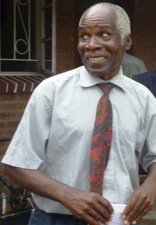 Pastor Phiri and his wife Abigail live on the church property in Naminjale, about 90 minutes west of Blantyre and about an hour from the Mozambique border, in an area surrounded by villages. The property includes the pastor’s home, a few outbuildings, classrooms and a worship center, which includes Weja’s office. They are planning for future growth as evidenced by a massive pile of bricks on the property that will be used to build more classrooms and the hostels mentioned above.
Pastor Phiri and his wife Abigail live on the church property in Naminjale, about 90 minutes west of Blantyre and about an hour from the Mozambique border, in an area surrounded by villages. The property includes the pastor’s home, a few outbuildings, classrooms and a worship center, which includes Weja’s office. They are planning for future growth as evidenced by a massive pile of bricks on the property that will be used to build more classrooms and the hostels mentioned above.
The Naminjale congregation is one of our largest congregations in Malawi with an average attendance of 50 adults. There were more than 150 in attendance on the day I spoke. They are a very musical group, blessed to have at least two choirs and a young adult band, all of whom performed for Malawi TV. The Naminjale congregation is growing and is looking forward to seeing where God will lead them. The members, who come from surrounding villages, are very poor, but their hearts are dedicated to Christ and to building up their property to serve many others.
Dzaleka Refugee Camp: Lokona and Furaha Tosha Bolikoko
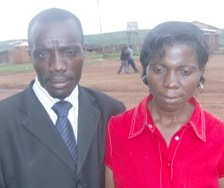 Though it was mid-week, many members and children came to church to hear the “representative of Grace Communion International from America.” The service began with many different songs and singing groups. The excitement for worship was contagious and I soon found myself dancing with the choir. It was great fun to hear God being praised in Chichewa and Kiswahili.
Though it was mid-week, many members and children came to church to hear the “representative of Grace Communion International from America.” The service began with many different songs and singing groups. The excitement for worship was contagious and I soon found myself dancing with the choir. It was great fun to hear God being praised in Chichewa and Kiswahili.
Pastor Bolikoko was a school teacher and bi-vocational pastor in the Democratic Republic of the Congo (DRC) when he fled to Malawi. He speaks French and Kiswahili. Since moving to Malawi, he has also learned Chichewa, but knows very little English. So my sermon was first translated into Chichewa and then he translated it into Kiswahili. It was interesting to see a reaction to a point first happen in English as some understood, then again in Chichewa as others understood and finally in Kiswahili.
Because all of the members are refugees, few can find employment in the surrounding villages and they must rely on the UN for their subsistance. The exceptions are professionals and businessmen who are often employed in civil service. The refugee camp has more than 10,000 people from Somalia, Burundi, Rwanda and DRC. Most of the members are from DRC. The members have found ways to provide income by raising pigs, and growing and selling crops. The members often make their own homes with mud and thatched grass on a plot they are given by the UN. Members in Australia provided funds for a foundation and for roof trusses for a church building and the members made the bricks. They were short of funds for the iron roof, and were concerned about the rains coming and washing away the foundation of the church, so on behalf of GCI, my congregation gave them enough to finish their roof. Another congregation in Australia recently purchased a keyboard and generator for them to use during worship.
The congregation has many needs – in particular blankets and mosquito nets. Many in the congregation are now suffering from malaria as it is rainy season and the mosquitos are out in abundance. If your congregation would like to purchase blankets and mosquito nets, please let me know by emailing me at Rick.Shallenberger@gci.org. We will coordinate with the Mission Developer and local pastoral teams.
Because the refugees continue to make their way to Malawi, the church continues to grow. Though they have little, they don’t let their needs stop them from worshipping with enthusiasm. As a result, the Dzaleka church is growing rapidly.
Kabanga: Overton & Molly Ngwira
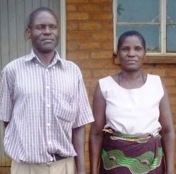 I did not speak in Kabanga, but I did visit the farm and spent time with Pastor Ngwira. Overton oversees the farm and pastors the congregation. Over the years the congregation has purchased several acres of land. In the dry season they make bricks and then they use those bricks to construct buildings on the property. To date they have a home for the farm caretaker, a large meeting hall for church and a three-room structure that houses a library and two meeting rooms. During the summer of 2012 one of the rooms will be converted to living quarters for a French college student who is going to live in the village for seveal months as a project for her school. She will work the farm and assist the church. In addition to the land the church has purchased, the village chiefs have also given them access to several acres to grow more crops or to graze cattle and goats.
I did not speak in Kabanga, but I did visit the farm and spent time with Pastor Ngwira. Overton oversees the farm and pastors the congregation. Over the years the congregation has purchased several acres of land. In the dry season they make bricks and then they use those bricks to construct buildings on the property. To date they have a home for the farm caretaker, a large meeting hall for church and a three-room structure that houses a library and two meeting rooms. During the summer of 2012 one of the rooms will be converted to living quarters for a French college student who is going to live in the village for seveal months as a project for her school. She will work the farm and assist the church. In addition to the land the church has purchased, the village chiefs have also given them access to several acres to grow more crops or to graze cattle and goats.
The church in Kabanga started with rapid growth, but it has since seen a decline. The leadership believes the decline is due to worshipping on Saturday, which is the main business day for the villagers. They are currently talking about moving the day of worship to Sunday, which will remove a large stumbling block and enable the church to grow.
The farm not only supports the church in Kabanga, but helps support other churches around Malawi. Their primary crop is maize (corn) and they also grow pumpkins and other vegetables. They are raising goats and are building pens so they can raise pigs as another source of income. In the future they’d also like to raise cattle.
The primary challenge is getting enough farm labor. They have plenty of ideas and little manpower. I suggested they look around and see and appreciate what God has already given them. I suggested God would provide manpower when and if he feels they need to expand further. They are quite successful in what they are currently doing and it’s not always necessary to try to do more and more beyond our means. They were receptive and very appreciative of my words and thanked me for coming on behalf of our denomination. They are a dedicated and hard working group of people whom God has blessed abundantly. His blessing to them is also a blessing to the other churches in Malawi.
Lilongwe: Macdonald & Ireen Mgunda
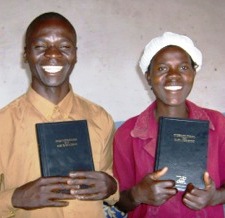 While I did not have the opportunity to visit the Lilongwe congregation which Macdonald pastors, I did spend time with him as we toured a bit of Lilongwe, and had a meeting and dinner with the Young Adult leaders on my first day in Lilongwe. On the following day, Pastor Mgunda was part of the team that traveled to the Dzaleka Refugee church and Kabanga Farm.
While I did not have the opportunity to visit the Lilongwe congregation which Macdonald pastors, I did spend time with him as we toured a bit of Lilongwe, and had a meeting and dinner with the Young Adult leaders on my first day in Lilongwe. On the following day, Pastor Mgunda was part of the team that traveled to the Dzaleka Refugee church and Kabanga Farm.
Besides pastoring the Lilongwe congregation, Pastor Macdonald works closely with Pastor Silvester Nkosi working with the Young Adult Leaders and assisting where needed with Dzaleka and Kabanga. Macdonald and Ireen have six children and are very interested in children’s ministry. One thing I noticed was Macdonald was nearly always smiling and showed tremendous enthusiasm for the church and for sharing the gospel.
Silvester and Molly Nkosi
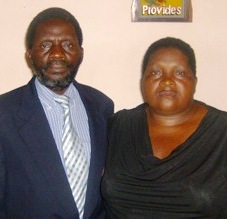 Silvester and Molly live in Lilongwe with three of their six children still living at home. Silvester is a teacher by profession and a pastor by calling. Ordained an elder in 1997, Silvester serves as Director for Youth and Children ministries for Malawi, while holding on to his teaching profession.
Silvester and Molly live in Lilongwe with three of their six children still living at home. Silvester is a teacher by profession and a pastor by calling. Ordained an elder in 1997, Silvester serves as Director for Youth and Children ministries for Malawi, while holding on to his teaching profession.
Over the years, Silvester has pastored several congregations in and around Lilongwe and continues to assist Macdonald Mgunda in the Lilongwe congregation and helps supervise unordained pastoral leaders. He is one of the founders and serves as the director of the Kabanga Church Farm project. He founded one youth camp and has served as assistant director at several others. He also serves as the pastoral liaison for the Dzaleka congregation, coordinating the needs of the members of the refugee church with the congregations around the world who desire to help.
Silvester was my host for my two days in Lilongwe and spent much of the day asking questions and showing a great desire to learn more about Trinitarian theology and its application to pastoral ministry and our journey with Jesus.
Postscript
Despite poverty and other great challenges, GCI in Malawi is rapidly growing. Our pastoral couples there are deeply dedicated and doing an amazing job leading our members to actively share God’s love and life with the people of their nation. I am inspired and humbled by their dedication to Jesus’ Great Commission. Please join me in praying for them.


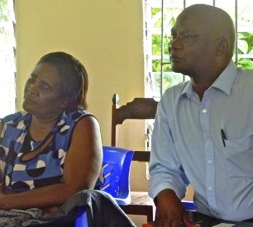

Rick, thanks for putting this report together. It was wonderful to see some of the faces again and read about the church there.
Rick, thank you very much for the report. It was good to take the time to read it and have the sense of what God is doing in this part of the world embedded in my mind. It seems that while they look outward for an example and for help, the people you showed us and their congregations are an example and serve to support our faith in God who has called us all.